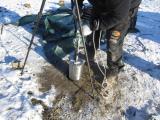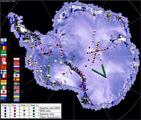
On October 8-13, 2012, a three-man team from the EarthScope Transportable Array and IRIS/PASSCAL installed a prototype "cold and dark" seismic station at Eagle Plains, Yukon Territory, Canada, just 30km south of the Arctic Circle. The station installation developed new methodologies for drilling a shallow, 55" deep borehole in exposed bedrock. Protection for electronics, power, and communication subsystems (from the elements, and from large wildlife) was provided by an all-weather hut bolted to bedrock.




